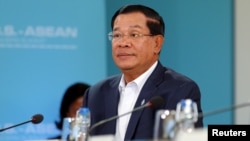Last week, days after The Hague’s Permanent Court of Arbitration awarded the Philippines a victory in its case against China in the dispute over rights to the South China Sea, Beijing began a massive public relations campaign to press its position.
Part of China’s campaign includes shoring up international support to denounce the ruling and approaching other nations to voice their backing for Beijing. Cambodia, which receives significant aid from Beijing, was one of the first to do so.
So what can be made of China’s use of what some call “checkbook diplomacy”?
“I think China, just like every other country in the world, through its development assistance, through its diplomacy, through its soft power… is really trying to advance, understandably, its own national interests,” said Curtis S. Chin, Asia Fellow with the Milken Institute. “So very clearly, when you look at Southeast Asia, China is very much a player for better and for worse. We see it in the trade connections between China and the Southeast Asian nations. …
“But really, all around Asia, China is increasingly a trade partner, and so what China is doing with its checkbook, with its diplomacy, is really trying to create friends and partners through its investments,” he said.
Strengthening influence
Scott Harold, associate director for the RAND Corp.’s Center for Asia Pacific Policy, said the 10 member states of the Association of Southeast Asian Nations regard ASEAN “as a way for those weaker, smaller Southeast Asia nations to have greater influence.”
However, Harold said, participation in ASEAN is only a portion of each member state’s foreign policy calculation.
“Member states that have disputes with China, for example, try to mobilize their Southeast Asian neighbors to craft a joint statement,” he said.
At times, Harold noted, member states may try to act in unison and address issues like the South China Sea. “But when China makes it clear for some weaker, smaller, poorer, more corrupt states that it is going to make them pay costs in their relations with China, then you see countries like Cambodia and Laos backing out,” he said.
Advancing interests
Chin said China’s aid to Phnom Penh, including a recent pledge of $600 million, is in line with Beijing’s practices because “for Cambodia, China is its most significant partner. Each nation is seeking to advance their own interests [and] Cambodia is getting tremendous amounts money from China.”
Chin doesn’t believe the aid was in the form of a quid pro quo, “but China is certainly getting an ally in China’s own efforts to advance its opinions in the region,” he said.
RAND’s Harold said there is some resentment toward China when it employs such tactics because "when Beijing says jump and your only right is to ask how high," he said, “is not very well appreciated ... and I think it may very well be a reality that small states are takers in the international system. But it’s not something they like.”
Looking to ASEAN’s future, Chin notes that for the past few years, the group’s foreign and finance ministers haven’t been able to speak with a single voice when it comes to China. So if China can “peel off” a member through “diplomacy or money or some mix of the two, clearly ASEAN suffers.”
China’s influence within ASEAN notwithstanding, Harold said a more troubling issue is the ineffective leadership from some of the organization’s large and/or strategic member states.
That’s not to say China’s involvement at certain times doesn’t have the effect of disrupting ASEAN’s unity. However, Harold said, Beijing doesn’t appear to have a long-term interest in driving wedges between members “because, frankly, ASEAN is riven with a number of disputes.”











